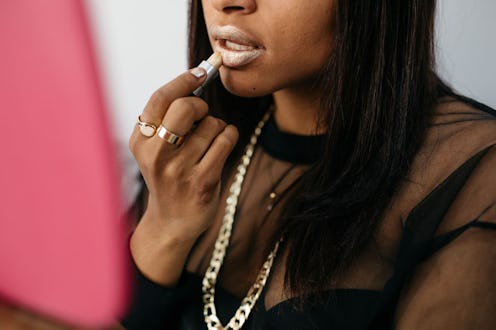Style
How Safe Is Your Make-Up? 6 in 10 women Don't Check The Ingredients of Their Make-Up

Does checking the ingredients of your beauty products really matter? It turns out, yes. Not doing so can actually be surprisingly dangerous, so a healthy dose of caution when you're at the make-up counter certainty won't go amiss. Luckily, discovering if your make-up is safe is relatively straightforward when you know what red flags to look for in the ingredient list.
In the interest of full disclosure, I'll admit it — I often buy make-up based on its branding, packaging, and celebrity endorsements. I'll also take into account how Instagrammable it is and any word of mouth recommendations, but ultimately I buy things simply because I want, need, and like that particular product. And I'm not alone. In fact, six in ten women have never checked the contents of their make-up, compared to a whopping 88 percent who check the contents on food packets, Holland & Barrett revealed after carrying out a survey of 1,500 women.
Until recently, I was one of the six in ten, but since learning more about some of the dangerous chemicals commonly used in beauty products, I'm taking new precautions. The problem is, when it comes to many of the ingredients that are bad for us, we've often never even heard of them. So how would the majority of buyers know what they need to avoid?
For example, synthetic preservatives called parabens are widely used in a range of grooming products, with Scientific American citing reports from the Campaign for Safe Cosmetics (CSC) that they "disrupt hormone function". Sodium lauryl sulfate (SLS), which is often found in mascara and cleansers, was found by a professor at the University of Bath to cause skin irritation. Then there's lead, which is so damaging when ingested that in Dec. 2016 the FDA stepped in to provide guidelines on the maximum content allowed in American make-up products. Also, we're lacking in information about the long-term effect of these chemicals, so unfortunately we don't always know about the damage they could potentially do in years to come.
The first step towards avoiding any of these pesky ingredients is of course to check the label for harmful ingredients before you buy. Key harmful ingredients to look out for include imidazolidinyl urea, propylene glycol, triclosan, and formaldehyde, as well as the substances mentioned above.
Remember, if something says it's organic, that isn't necessarily good enough. Beauty expert Victoria Hall reports in The Telegraph that a product can be labelled "organic" even if only one percent of the formula is, so if in doubt, ask. Then, you can consider replenishing your make-up bag with a range of natural products that are just as well-formulated and designed to look great as well as being better for you. My favourites are RMS Beauty, Kjaer Weis (the packaging is amazing) and Tata Harper. Beauty store Space NK has a huge range as well.
Once you're convinced of a brand's credentials, there's a whole host of benefits to buying organic products. Firstly, many of the companies producing them are environmentally concerned, too, and use sustainable materials in their packaging. Take Australian natural cosmetics firm Jurlique, who according to Harper's Bazaar has set itself the aim of reducing 20 percent of its emissions and waste by 2020.
Secondly, chemicals like methylisothiazolinone are responsible for redness, breakouts, and skin irritation. Using natural products may be just the thing your skin needs to calm down. Buying these products also supports small, developing brands who are trying to make a difference — CoverFX creates vegan, cruelty-free products. Many of them use botanical ingredients, which have been famed for their healing powers for centuries. REN's Glycolactic Radiance Renewal Mask contains papaya and pineapple extract and helps get rid of dead skin cells.
If you're now thinking you need to chuck your entire make-up bag and start again, don't, and don't panic. Just start shopping for natural beauty when you run out of existing products, and figure out the brands you love. So long as you're armed with information, you'll be able to make a decision that works for you, and if you do go natural, your skin and insides will thank you for it.